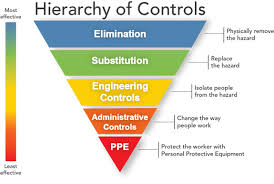Take a look around and read through our posts for the latest on insurance, workers' compensation, and Safety and Loss Control.
5/1/2019 10:39:25 AM
Hierarchy of controls is a system used to eliminate or minimize exposure to identified hazards in the workplace.
This system is used as a guide to implement feasible and effective solutions to prevent incidents.
The premise behind hierarchy of control is to follow a systematic approach in identifying the most effective methods to prevent incidents.
Organizations should consider using the hierarchy of controls process whenever they are implementing corrective actions.
There are five levels to the hierarchy of controls:
Elimination - Physically remove the hazard
Substitution - Replace the hazards
Engineering controls - Isolate people from the hazard
Administrative control - Change the way people work
Personal protective equipment (PPE) - Protect the worker with PPE

To use the hierarchy start at the top (eliminate) with the most effective control and move down each level to the least effective control method (PPE).
When implementing corrective actions, first consider the feasibility of completely eliminating the hazard. If elimination is not feasible move down a level in an attempt to find another solution. Eventually you may use administrative controls and, or PPE to protect your workers. These least effective controls should not be considered until we have considered the more effective controls of elimination and substitution.
Anytime an agency is seeking to control hazards! Always start at the top of the hierarchy of controls diagram and work your way down. This ensures due diligence, and that the most effective controls are adopted.